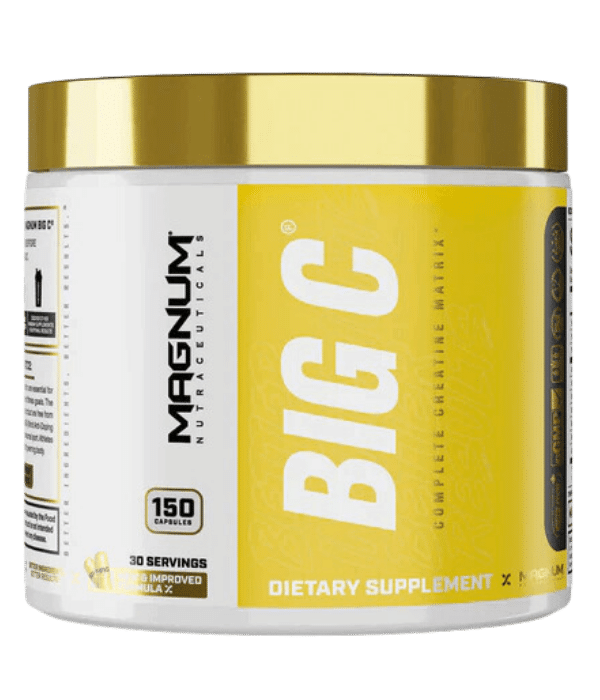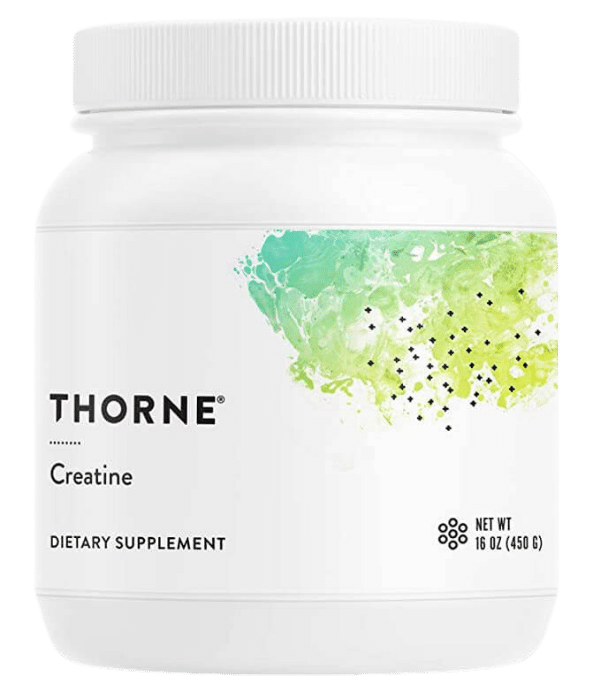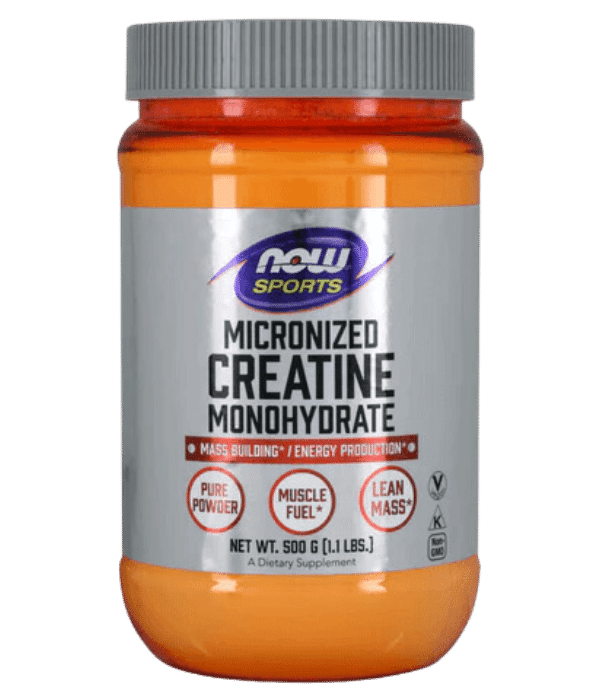Talk to a Registered Dietitian and use INSIDER20 for 20% off!
Talk to a real Dietitian for only $99: Schedule Now
This post contains links through which we may earn a small commission should you make a purchase from a brand. This in no way affects our ability to objectively critique the products and brands we review.
Evidence Based Research To fulfill our commitment to bringing our audience accurate and insightful content, our expert writers and medical reviewers rely on carefully curated research.
Read Our Editorial Policy
However “market-y” and technical the name may sound, creatine is actually a naturally occurring amino acid that builds muscle and benefits the brain.
However, not all creatine is created equal—our top 5 creatine supplements are set apart by third-party testing standards, the forms of creatine they use, and more.
As for our favorite creatine supplement, we can’t deny the formulation know-how of Magnum Big C Iso-Creatine Matrix, which blends four forms creatine to offset the water retention issue.
Whatever you’re looking for in the creatine department, we’ll show you below how to sift apart high-quality creatine supplements from the so-so options.
Best Overall | Cleanest Formulation | User Experience | |
|---|---|---|---|
| Product | Magnum Big C | Thorne Creatine | NOW Sports |
| Creatine Per Serving | 3.6 g | 5 g | 4.2 g |
| Price Per Gram† | $0.44 Shop Now | $0.08 Shop Now | $0.07 Shop Now |
Best for: Athletes entering the cutting phase who don’t want water retention (or artificial ingredients).
Set apart from the herd (and boy, it’s a herd) with a savvily curated blend of four creatines, adaptogens, and more, Magnum Big C Iso-Creatine exudes “ooh! pick me!” energy.
The creatine blend and support nutrients enhance absorption, lean muscle growth, and importantly, no water retention—a consistent issue with most creatine supplements.
Specifically, the bloating comes from an increase in the osmotic pressure of muscle cells caused by creatine monohydrate, which invites water from the surrounding tissues to rush into these cells.
By using various forms of creatine, Magnum prevents the issue.
As such, we highly recommend Magnum Big C to anyone looking for a super clean creatine that focuses on real muscle mass gains without the artificial “water pump.”
We consider Magnum Big C to be the best creatine supplement at the moment, and definitely the best creatine pill.
Best for: Anyone looking for a pure and super clean source of creatine manufactured under stringent sourcing and testing standards.
Is it a copout to label the single-ingredient option as the “cleanest”?
Nah, we don’t think so, and here’s why: in Thorne’s case, that single ingredient has been tested four times and manufactured for maximum absorption. Hence, we’re convinced it’s the best creatine monohydrate around.
Beyond heavy metals and other contaminants, this NSF Certified for Sport creatine is tested for more than 200 stimulants, steroids, and other substances banned by athletic organizations.
It also doesn’t hurt that Thorne Creatine has been used and endorsed by more than 10,000 pro athletes and 100 sports teams.
You won’t find any groundbreaking innovations here, but if you just need pure creatine to do its thing reliably and at a competitive price, Thorne is a solid pick.
Best for: Anyone who wants the benefits of creatine with enhanced absorption and ease of use.
We can (and will) roast that circa-1990 color scheme and label design every time, but NOW Sports Micronized Creatine Monohydrate makes up for it with a pure and innovative formulation.
Sure, they are neither the only ones nor the first to offer micronized creatine—meaning the particles are far smaller than normal creatine for improved absorption—but the price point and brand reputation in this case help this product stand out among the rest.
The other benefit to micronized creatine is that it blends more easily with water than standard powders, making this product very easy to use.
Finally, NOW Sports Micronized Creatine is non-GMO, vegan, steroid free, and made under GMP (good manufacturing practices) standards.
Best for: Gym rats or other high-frequency creatine users (brain benefits too, ya know) looking for a trustworthy and very affordable supplement.
Another creatine-only product made with zero additives, Naked Nutrition tests their Naked Creatine for heavy metals (arsenic, cadmium, etc.), allergens, and gluten every time.
It also bears mentioning that Naked Creatine is manufactured in the USA, and though we still count the synthetic creatine powder as a con, their claim of it being “chemically and functionally identical” to that of animal-derived creatine is not unfounded.
So, you can still attain the benefits of standard creatine—muscle mass increase, cognitive benefits, etc.—effectively without having to worry about artificial flavoring, preservatives, and all that other nonsense.
Finally, and ever-so-importantly, Naked Creatine is the most cost-efficient item on our list!
Best for: Anyone looking for a pre-workout + creatine combo with low enough creatine concentrations to take regularly while still seeing benefits.
Having personally met with 4 Gauge founder Connor Southworth as part of our 4 Gauge Review, we can confirm the formulation know-how of this pre-workout and the team behind it.
For example, 4 Gauge uses less caffeine (150mg) than most pre-workouts while incorporating L-theanine to help focus that energy, where most other products will leave you white-knuckling your shaker bottle and itching all over the place like a nut.
Also included in the pre-workout are natural vasodilators (L-Citrulline Dl-Malate) to offset the vasoconstriction action of caffeine, the amino acid acetyl-L-carnitine for enhanced energy, and more.
Each serving delivers one gram of creatine, which, while considerably less potent than those on this list, is still a functionally relevant amount in terms of promoting muscle gain—especially when paired with vasodilators.
It’s most frequently recommended to take creatine within 30-60 minutes before a workout, but your specific goals (cutting vs bulking, recovery, etc.) may influence when and how often you take it.
More serious weightlifters in bulking phases will often take creatine both before and after a workout.
There are two types of creatine in common use: capsules and powder. Because the body takes a bit longer to break down capsules, and because creatine capsules are often a bit more expensive than creatine in powdered form, most people prefer taking creatine powder.
These factors aside, there is no major difference in potency or function between the two.
The rate at which the body begins to noticeably demonstrate the benefits of creatine supplementation can vary greatly based on situational and/or health-related factors.
It also depends on whether or not you’re using more intense phases (multiple servings for 3-7 or so days) or taking creatine more consistently.
These Texas A&M researchers found that 20 grams of creatine a day (four servings of 5 grams) for 5-7 days was sufficient to “increase muscle creatine stores.”
The article authors also noted that lower amounts of creatine (2-3 grams) used over a period of 30 days can have a similar effect.
It’s always best to speak with your primary care physician if you have any questions or concerns about whether or not creatine (or any other supplement/product) will be safe for you.
As for the research consensus, a large majority of findings conclude that it’s safe to take even larger doses (around 25 grams) of creatine every day for up to several years.
This doesn’t mean potential side effects are any less likely or severe, but as the body already produces its own creatine, it is generally well tolerated.
As long as you’re prepared for and/or have found a workaround (i.e., Magnum Big C Iso-Creatine Matrix) for the potential of water retention, creatine is perfectly compatible and frequently used for the purpose of toning.
Most importantly, your style of exercise, diet, and other factors will be crucial in determining whether your use of creatine contributes to weight gain or weight loss.
Magically and without effort?
Certainly not.
As part of a consistent weight training regimen complete with the appropriate diet?
It certainly can.
Considering it’s produced in your muscles (and brain) already, the evidence behind creatine’s efficacy for building muscle is about as solid as it gets.
As usual, be on the lookout for third-party testing, added ingredients, and variants of the product that affect quality, absorption, etc.
Closely monitor your use—especially if you’re taking creatine in more intense phases—to determine the safest and most effective frequency and dosage for you.
There are too many high-quality creatine supplements out there to compromise. If you see nasty preservatives, artificial flavoring and/or other additives, get out of there!